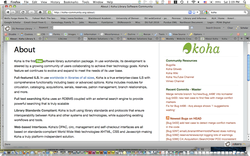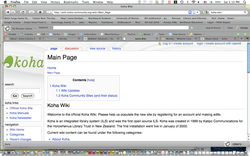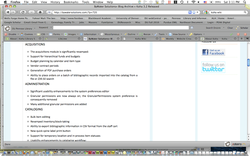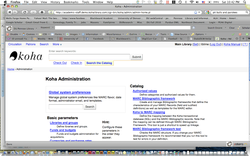Technology Assessment
KOHA

Koha is an open source ILS that was designed in New Zealand in 1999 and runs with a Linux based OS and is primarily written in Perl. http://koha.org/
COSTS

Is the cost a one time expenditure or ongoing? There is no basic cost for Koha because it is an open source ILS designed to be free of charge. There are no licensing fees, and upgrades and modules are free of charge because they are written and maintained by the Koha networks of users. There is the option with Koha to contract with an independent company that does it’s own development and support services, such as LibLime (http://www.liblime.com), or Bywater Solutions (http://bywatersolutions.com/).
Does the initial expense cover upgrades in the future? What is included in the cost? support? training? Installation? Migration to new product?
All of the Koha software is free of charge, including upgrades and online support, and all costs incurred would be for services outside of the software. An example of the initial costs with a small to medium sized library with Bywater Solutions handling the installation process would be approximately $1800. This includes a technician on-site for 3 days of training and installation, and also includes unlimited support questions afterward with phone calls and email for the year. Thereafter the institution can choose to pay a yearly fee of $1800 for unlimited support or $75 per incident ticket. These companies also offer “packages” such as a data migration package, which means that they will handle all of the aspects of moving a library’s information from the previous ILS to Koha. These outside companies also offer hosting services and, for example, Bywater will host a small to medium sized library for approximately $360 a year, and handle all technical issues for the library.
Does the initial expense cover upgrades in the future? What is included in the cost? support? training? Installation? Migration to new product?
All of the Koha software is free of charge, including upgrades and online support, and all costs incurred would be for services outside of the software. An example of the initial costs with a small to medium sized library with Bywater Solutions handling the installation process would be approximately $1800. This includes a technician on-site for 3 days of training and installation, and also includes unlimited support questions afterward with phone calls and email for the year. Thereafter the institution can choose to pay a yearly fee of $1800 for unlimited support or $75 per incident ticket. These companies also offer “packages” such as a data migration package, which means that they will handle all of the aspects of moving a library’s information from the previous ILS to Koha. These outside companies also offer hosting services and, for example, Bywater will host a small to medium sized library for approximately $360 a year, and handle all technical issues for the library.
SUPPORT

What is the granularity of Support? i.e. Will support services cover only major support questions or daily smaller questions? What is the Duration of Support? Will it be only during installation and training? Or will it remain for the life of the partnership?
Where are the technicians located? Will there be someone locally available if there are any issues that require in-person service? Hours available?
Since it is an open source software, there is no specific support service other than the one that is maintained by the communities of Koha users and developers. This system is primarily based on the assumption that your specific institution will have someone on staff able to handle basic programming questions and problems and can then refer to the free Koha networks for any answers that they cannot find themselves. Koha maintains a very active user network, http://koha-community.org/, as well as a Wiki page, http://wiki.koha-community.org/wiki/Main_Page, that contain several guides and forums that allow users to find answers themselves or the ability to ask other users about their issues; as well as a live chat forum where users can talk directly to each other for support and a mail list that gives the user some more direct access; but it is up to the user to find what they need from these outlets. If the library chooses to use one of the independent companies they have the option of paying for support services as long as they wish to. The support can include all major and minor questions and 24/7 service if desired. The support would include all installation and training as well as upkeep of the system.
When there are upgrades in the product will there be sufficient training provided?
Will they support migration, etc. (all aspects of software) if there are changes?
Will they support current formats, i.e. The existing software in use at the library?
What happens if company goes out of business?
The Koha developers are very mindful of upgrades and releases and will document the changes and protocols as they are established. It will be up to the library to keep abreast of these changes and implement them as needed, or desired. As discussed previously, the free support networks will help to answer regarding questions regarding migrations and upgrades. Koha can easily be supported in tandem with many other library technologies, but again, it is up to the institution itself to seek out the answers regarding compatibility issues and any other nuances of the software. The pay services include all of these issues in their coverage and are well versed in dealing with most compatibility and migration problems. Koha itself will never go out of business as long as there is an interest in using it, but there is the possibility that the pay services could, and finding no other documentation otherwise, it seems as if the user would just have to turn to the free support services if the pay support services were to go out of business
Where are the technicians located? Will there be someone locally available if there are any issues that require in-person service? Hours available?
Since it is an open source software, there is no specific support service other than the one that is maintained by the communities of Koha users and developers. This system is primarily based on the assumption that your specific institution will have someone on staff able to handle basic programming questions and problems and can then refer to the free Koha networks for any answers that they cannot find themselves. Koha maintains a very active user network, http://koha-community.org/, as well as a Wiki page, http://wiki.koha-community.org/wiki/Main_Page, that contain several guides and forums that allow users to find answers themselves or the ability to ask other users about their issues; as well as a live chat forum where users can talk directly to each other for support and a mail list that gives the user some more direct access; but it is up to the user to find what they need from these outlets. If the library chooses to use one of the independent companies they have the option of paying for support services as long as they wish to. The support can include all major and minor questions and 24/7 service if desired. The support would include all installation and training as well as upkeep of the system.
When there are upgrades in the product will there be sufficient training provided?
Will they support migration, etc. (all aspects of software) if there are changes?
Will they support current formats, i.e. The existing software in use at the library?
What happens if company goes out of business?
The Koha developers are very mindful of upgrades and releases and will document the changes and protocols as they are established. It will be up to the library to keep abreast of these changes and implement them as needed, or desired. As discussed previously, the free support networks will help to answer regarding questions regarding migrations and upgrades. Koha can easily be supported in tandem with many other library technologies, but again, it is up to the institution itself to seek out the answers regarding compatibility issues and any other nuances of the software. The pay services include all of these issues in their coverage and are well versed in dealing with most compatibility and migration problems. Koha itself will never go out of business as long as there is an interest in using it, but there is the possibility that the pay services could, and finding no other documentation otherwise, it seems as if the user would just have to turn to the free support services if the pay support services were to go out of business
USABILITY

Learnability: The ease of accomplishing basic tasks when first introduced to the software.
Effectiveness: accuracy and completeness with which users achieve specific goals.
Efficiency: The speed in which tasks can be completed once users are familiar with the software design.
Errors: The amount of errors, their severity and the ability of users to recover from these errors.
Satisfaction: How users feel and the freedom of discomfort and positive attributes towards the use of the software. Memorability: The proficiency of using the software after not using it for a period of time.
Usability when dealing with Koha will largely be a subjective issue for each particular user and institution, but we know from the constant upgrades and improvements made to the software that these issues are constantly being addressed by the developer networks. For example as found on the Bywater support page, http://bywatersolutions.com/?p=720, there are several improvements that were made from the last version of the software.
Some of these include: Support for hierarchical funds and budgets; Budget planning by calendar and item type; Vendor contract periods; Generation of PDF purchase orders; Ability to place orders on a batch of bibliographic records imported into the catalog from a file or Z39.50 search; Ability to define library transfer limits; Email checkout slips; Option to enable alert sounds during checkin and checkout; Improvements in Koha’s ability to express circulation policies; Option to charge fines using suspension days instead of money; Hold policies are now on the library/itemtype/categorycode level; Renewal policies are now on the library/itemtype/categorycode level; Ability to specify an expiration date for a hold request when placing it via the staff interface or OPAC; and Daily batch job to cancel expired holds.
The Koha Library Software Community also includes a page to help users get their issues examined and fixed:
http://koha-community.org/about/enhancing-koha/
Each institution will have to make its own decisions upon the issues of usability but since it is open source, they have the ability to fix those issues on their own if they have the technical capability. Otherwise they can contact the free support network for help. The pay services do offer the services of adapting certain technologies for specific instances but these will end up accruing more costs, and it may behoove the library to wait for the upgrades to be made in the free format.
Effectiveness: accuracy and completeness with which users achieve specific goals.
Efficiency: The speed in which tasks can be completed once users are familiar with the software design.
Errors: The amount of errors, their severity and the ability of users to recover from these errors.
Satisfaction: How users feel and the freedom of discomfort and positive attributes towards the use of the software. Memorability: The proficiency of using the software after not using it for a period of time.
Usability when dealing with Koha will largely be a subjective issue for each particular user and institution, but we know from the constant upgrades and improvements made to the software that these issues are constantly being addressed by the developer networks. For example as found on the Bywater support page, http://bywatersolutions.com/?p=720, there are several improvements that were made from the last version of the software.
Some of these include: Support for hierarchical funds and budgets; Budget planning by calendar and item type; Vendor contract periods; Generation of PDF purchase orders; Ability to place orders on a batch of bibliographic records imported into the catalog from a file or Z39.50 search; Ability to define library transfer limits; Email checkout slips; Option to enable alert sounds during checkin and checkout; Improvements in Koha’s ability to express circulation policies; Option to charge fines using suspension days instead of money; Hold policies are now on the library/itemtype/categorycode level; Renewal policies are now on the library/itemtype/categorycode level; Ability to specify an expiration date for a hold request when placing it via the staff interface or OPAC; and Daily batch job to cancel expired holds.
The Koha Library Software Community also includes a page to help users get their issues examined and fixed:
http://koha-community.org/about/enhancing-koha/
Each institution will have to make its own decisions upon the issues of usability but since it is open source, they have the ability to fix those issues on their own if they have the technical capability. Otherwise they can contact the free support network for help. The pay services do offer the services of adapting certain technologies for specific instances but these will end up accruing more costs, and it may behoove the library to wait for the upgrades to be made in the free format.
FEATURES

What are the staff function features? What are the cataloging features? What are the circulation features? What are the acquisitions features? What are the serials features? What are the OPAC features?
Koha was developed by librarians and information professionals so most of the features are designed with that point of view in mind and can be customized according to the needs of the library. I discuss the major features very briefly here:
http://www.screencast.com/users/john.adams/folders/Default/media/51bf4c03-1518-405a-92e6-d398457b45d8. Make sure to select koha1.
Are the features relevant to the library’s needs?
Are the features user-friendly?
Do the features require extra training and support?
Is there a fee associated with any of the features?
How customizable is the software?
How often is the software upgraded?
Do the features make the system more reliable?
Are the staff and patron interfaces attractive/user-friendly?
Since Koha is customizable, many of the features utilized can be up to the library as to what they want to use or not. Because of this flexibility it should increase librarian and patron satisfaction, because if something is redundant or complicated, it can easily be eliminated or possibly modified. Free support is available for almost everything in regards to feature customization as long as the on-staff personnel know where to access it. Otherwise the Pay services should be able to accomplish that pretty easily. Upgrades are usually a few a year but they are normally pretty well documented on the Free support sites and that will help with upgrades and transitions. As was mentioned previously, since this is an open source system and people continue to utilize it, it shouldn't lose its functionality. They only way it will go away is if people want it to. The interfaces are customizable too, so the attractiveness factor is only limited by the imagination of the IT staff involved.
CONCLUSION
From a personal standpoint the software has the potential to be a very intuitive system that both librarian and patron can use and learn very easily since it has had several incarnations to be tested and improved upon. Given it's malleable nature Koha seems like a library's dream if it has the technical know how. The option for Pay support seems as if it may be a fiscal option for those institutions that lack the technical prowess because relatively speaking it seems like a couple thousand a year is a small price to pay for the freedom and flexibility of Koha. Given it's almost fanatical community support, I would say that this is a very good option for a small-medium sized institution.
